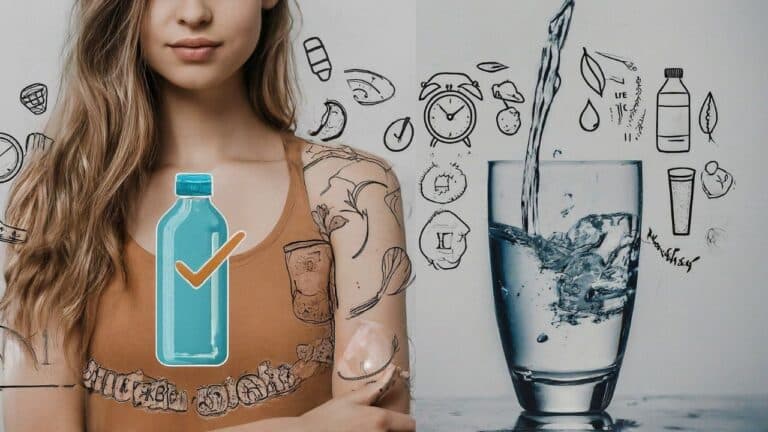Water is the elixir of life. It’s a simple, everyday substance that often goes unnoticed in our daily routines, yet its importance cannot be overstated. From maintaining the balance of bodily fluids to keeping our skin glowing, water plays an indispensable role in our overall health and well-being. This article delves deep into why drinking enough water is crucial, how it benefits different aspects of our health and tips on how to ensure you stay hydrated.
Why is Water So Important?
Water makes up about 60% of the human body. It’s involved in almost every function that keeps us alive and healthy. Here’s a closer look at why water is so essential:
- Regulates Body Temperature: Water helps regulate our body temperature through sweating and respiration. When we’re hot, we sweat, and the evaporation of this sweat from the skin helps cool us down.
- Supports Digestion and Nutrient Absorption: Water is a key component of saliva, which begins the digestion process. It also helps dissolve vitamins, minerals, and other nutrients from our food, making them accessible to the body.
- Keeps Joints Lubricated: Our joints are surrounded by cartilage, which contains a large amount of water. Staying hydrated helps maintain this lubrication, reducing friction and preventing joint pain.
- Flushes Out Toxins: Water is essential for the kidneys to function properly. It helps flush out toxins and waste products from the body through urine, reducing the burden on the kidneys and preventing kidney stones.
- Boosts Skin Health: Proper hydration helps keep our skin moisturized, reducing the appearance of fine lines and wrinkles. It also helps flush out toxins that can cause acne and other skin issues.
- Maintains Cardiovascular Health: Blood is over 90% water. Dehydration can lead to thicker blood, making it harder for the heart to pump, potentially leading to high blood pressure and other cardiovascular issues.
Signs of Dehydration
Dehydration occurs when you use or lose more water than you take in, and your body doesn’t have enough water to carry out its normal functions. Here are some common signs:
- Dry Mouth and Throat: One of the first signs of dehydration is a dry mouth and throat.
- Fatigue: Lack of water slows down enzymatic activity in the body, leading to fatigue.
- Headaches: Dehydration can cause headaches and even migraines due to reduced blood flow to the brain.
- Dark Urine: Dark yellow or amber-colored urine is a telltale sign that you’re not drinking enough water.
- Dizziness or Lightheadedness: This can happen when dehydration causes a drop in blood pressure.
How Much Water Should You Drink?
The amount of water you need depends on various factors, including your age, gender, weight, and activity level. However, a common recommendation is the “8×8 rule”: eight 8-ounce glasses of water a day, which is about 2 liters or half a gallon.
For some people, more water is necessary. For instance:
- Athletes: If you’re an athlete or engage in heavy physical activity, you’ll need more water to replace the fluids lost through sweat.
- Pregnant or Breastfeeding Women: Extra fluids are required to stay hydrated during pregnancy and breastfeeding.
- People in Hot Climates: If you live in a hot or humid climate, you’ll need more water to stay hydrated.
Tips for Staying Hydrated
- Carry a Water Bottle: Having a reusable water bottle with you at all times is a great reminder to drink water throughout the day.
- Set Reminders: Use your phone or a hydration app to set reminders to drink water regularly.
- Eat Water-Rich Foods: Incorporate fruits and vegetables with high water content, like cucumbers, watermelon, and oranges, into your diet.
- Drink Water Before Meals: This not only helps with hydration but can also prevent overeating.
- Start Your Day with Water: Drinking a glass of water first thing in the morning helps kickstart your metabolism and rehydrates your body after hours of sleep.
The Dangers of Overhydration
While it’s crucial to stay hydrated, it’s also possible to drink too much water, leading to a condition known as hyponatremia or water intoxication. This occurs when the balance of electrolytes in your body is disrupted by an excessive intake of water. Symptoms can include nausea, headache, confusion, and in severe cases, seizures.
Also, read our other article related to the Importance of Drinking Water– https://www.shortlyinfo.com/drinking-water-correctly-guide/
Conclusion
Water is not just a thirst-quencher; it’s a critical component of our health and well-being. By understanding its importance and ensuring you consume adequate amounts daily, you can improve your physical health, boost your mental clarity, and enhance your overall quality of life. So, next time you reach for a beverage, remember that nothing beats a refreshing glass of water.
Read Article by Harvard – How much water should you drink? by https://www.health.harvard.edu/staying-healthy/how-much-water-should-you-drink


